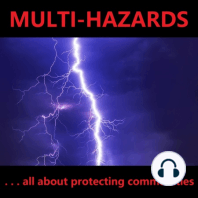66 min listen

Multi-Hazard Early Warning Systems with Dr. Bapon Fakhruddin
Multi-Hazard Early Warning Systems with Dr. Bapon Fakhruddin
ratings:
Length:
65 minutes
Released:
Aug 11, 2021
Format:
Podcast episode
Description
Multi-Hazard early warning systems for potential disasters can mean the difference between life and death for local residents. Dr. Bapon Fakhruddin, an expert who has been involved with implementing these early warning systems in more than 25 countries, is on the Multi-Hazards podcast today to tell us all about it. This is an essential part of reducing disaster risk, adapting to climate change and ultimately keeping communities safe. Have a listen! Study Guide here (on left where it says "PDF"): Topics include: * Why has Bangladesh been important in the Disaster Risk Reduction (DRR) field? * How did Dr. Bapon Fakhruddin get involved in DRR? * Why should Disaster Risk Reduction (DRR) and Climate Change Adaptation (CCA) be "merged" in many ways? * What's the global risk assessment framework (GRAF)? * Emergency or early warning systems in Disaster Risk Reduction (DRR): What are these? And why are they so complex? * What does "multi-hazards" mean? How do multi-hazards relate to warning systems? * What is the Sendai Framework and what's its recommendation of "people-centred multi-hazards early warning systems? * What are the eras of early warning system development? * What are early warning systems connection to the military? * What's the newest definition of "hazard" from the United Nations Disaster Risk Reduction office and the International Science Council? * What does the 1981 punk song by The Clash "Should I Stay Or Should I Go?" have to do with early warning systems? * Risk communication: What's this in a nutshell? And how does this relate to emergency warning systems? * Why are tsunami warning systems so expensive? * After an earthquake, how many minutes will it take before a tsunami comes? * Why is "indigenous knowledge" so important for Disaster Risk Reduction (DRR) and science in general? * Why does Dr. Bapon Fakhruddin appreciate indigenous cultures so much? * Why are people sometimes reluctant to heed early warning signals? * Why is trust in authorities a big factor for early warning signals and risk communication? Dr. Bapon Fakhruddin's Bio: Dr. Fakhruddin is an expert climate change risk assessor with 19 years’ global experience in working on disaster risk and climate resilience projects. This experience is a major advantage in climate change adaptation and mitigation strategy development. His key areas of expertise are climate and multi-hazard risk assessment, disaster preparedness, early warning and emergency response and coastal community resilience. He has designed climate change and disaster response projects in more than 25 countries in Asia and the Pacific. During his career, Dr. Fakhruddin helped to design major international multi-hazard early warning systems for floods, cyclones and tsunamis to save lives and stop property damage. His most high profile work has been developing multi-hazard warning systems including a tsunami warning system for Indian Ocean countries following the deadliest one in history - the 2004 Boxing Day Tsunami. Dr. Fakhruddin was appointed by the Government of New Zealand to develop a national climate change risk assessment framework. Dr. Fakhruddin graduated in civil engineering and has a Masters’ in Water Engineering and Management from AIT, Thailand. He has a PGD in Integrated Water Resource Management from Canada’s United Nations University and a PhD in Water Engineering and Management from Italy’s Politecnico di Milano. He is a certified Instructor of Incident Command System (ICS) for disaster response from United States Forest Service (USFS). Dr. Fakhruddin is currently working as a mentor and supervisor for postgraduate study in disaster risk management in University of Auckland (UoA). He is a Steering Group of the Global Risk Assessment Framework (GRAF) of UNDRR. Co-Chair for the Disaster Loss DATA and Risk Interpretation and Applications (RIA) Working Group of IRDR of ISC/UNDRR. He is also Co-Chair CODATA task group FAIR Data for Disaster Risk Research. Bio is from LinkedIn:
Released:
Aug 11, 2021
Format:
Podcast episode
Titles in the series (92)
City Planning & Climate Risk - Interview with Christine Callihoo: Multi-Hazards Podcast S01 E05 by The Multi-Hazards Podcast